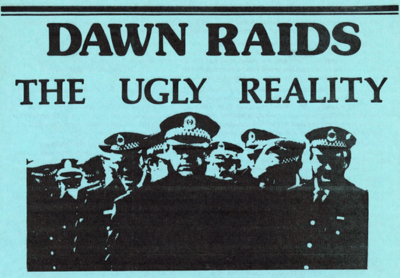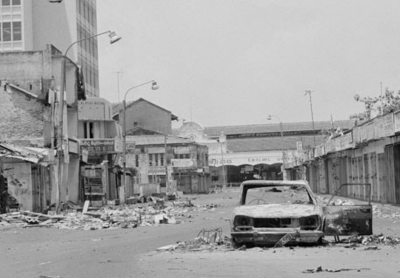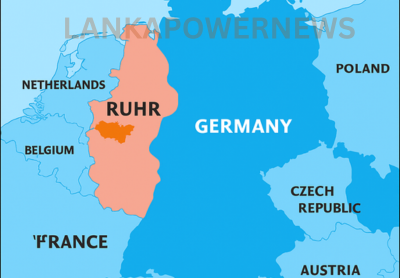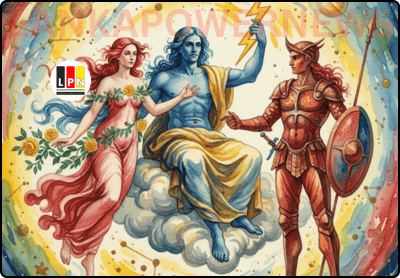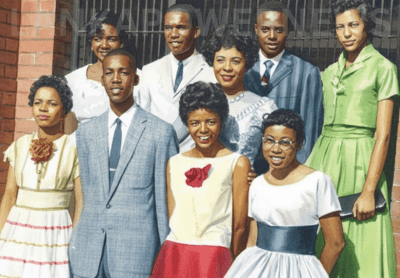New Zealand Dawn Raids.
The historical impacts of the Dawn Raids vary, but a significant impact – specifically on the short-term – was the emotional trauma inflicted on those involved first-hand. In regards of short term social impacts of the Dawn Raids, a commonly discussed but undeniably important aspect is the treatment of Polynesians at the time and even how it affected the each generation present in New Zealand at the time – older workers pursuing opportunities to earn money for their families overseas and younger members of the community who could have partaken in activism or maybe grew to leave the events in the past, a way of coping that can be considered a long-term impact.
Short-term Impacts of the Dawn Raids
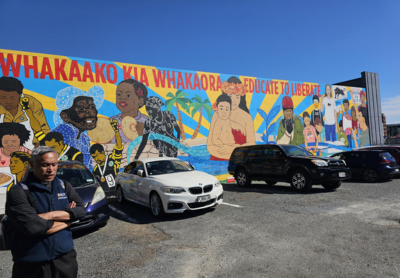
https://www.mch.govt.nz/sites/default/files/2024-08/rev-sofi-pua-my-village-walking-tour.jpg
In recounts by primary sources such as Reverend Strickson-Pua, someone who had experience first-hand with the Polynesian Panthers, many outline the interactions in a rash light. “New Zealand’s history of the way it treated Samoans and Tongans at that time… Our people had door-knocking by the police, dogs going through, people having to line up on Ponsonby Road, K Road (Karangahape Road),” These interactions were described by Reverend Alec Toleafoa, another who had experienced the Raids in his youth, “…state sanctioned racism, state sanctioned terror”.
Knocking door to door.
It is important to realise that though accounts differ from person to person, whether Pacific, Police, Government official etc – the social impressions made caused widespread feelings of shame, embarrassment, anger. Lives were disrupted. Though the Raids ended on the terms of the Pacific community, thanks to the Polynesian Panthers, the emotional consequences affected almost everybody involved, which may have led to later-on developments in advocating for change. The social ramifications of the Dawn Raids affected the Pacific Community on an emotional and widespread scale, however outwardly lasting a shorter period due to an unspoken practice of leaving the events behind instead of talking about them further.
What else?
Another short-term impact of the Dawn Raids was the economic disruption that occurred during and after the event. The arrival of Pacific people from their various home countries was due to the economic boom that took place after the war – there were many jobs and New Zealand needed more workers. Polynesians seeking financial opportunities entered the country, and were welcomed in. However, New Zealand’s economy hit a downturn in the 1970s, paired with an oil crisis, leaving the Labour party to look for something to do – or someone to blame. In what the Government called immigration control and the Polynesians called racial targeting, mass amounts of Pacific workers were deported.

https://nzhistory.govt.nz/sites/default/files/dawn-raids-hero.jpg
As said in the ‘Dawn Raids, Ugly Reality’ article published at the time: “Doesn’t it matter as long as it only happens to Polynesian citizens? This whole case exemplifies the racism that is deeply entrenched in our institutions, and the gross injustices that stem from it,” This not only had an effect on the industries in New Zealand who were largely made up of immigrants, but affected New Zealand’s diplomatic connections with Polynesia itself. As it turned out, the majority of the immigrants in New Zealand at the time had been European, the small minority being Polynesian – however the majority of those apprehended on the basis of being overstayers were Polynesians. These discriminatory acts not only upset neighbouring countries, worsened already crippling economic statures and impacted the reputation of New Zealand itself – they didn’t even fulfill what the Government intended in hopes of solving financial problems.
Long-term Impacts of the Dawn Raids
The Dawn Raids, an impactful event that occurred in New Zealand during the 1970s, happened over the course of around five years, but left lasting effects of disharmony in New Zealand to this day with consequences on NZ cultural diversity.
One of such impacts was the decrease in the level of distrust evident between Islander communities and Government forces. After the frequent – and commonly unjust – interactions between the groups, deep-rooted shame cloaked most of those who experienced the Dawn Raids, a blanket of stigma covering the event. As said by Reverend Alec Toleafoa, a primary source on the Raids as he had lived through them as a teenager “Even today it is extremely difficult for people to come forward and tell their story…One of the enduring effects of the Dawn Raids is the sense of shame, the sense of shame that they were labelled as overstayers and illegal.”
Significantly, it is only recently that the Government had formally apologised to those affected – Prime Minister Jacinda Ardern in 2021. She stated that the ‘wounds’ of the event are still deep more than fifty years later and introduced programs funded by the Government to assist Pacific communities in areas of education such as scholarships. This shows that the Government is aware of the impression made on the Pacific population of NZ during the Raids and also agreed that the community was deserving of an apology. Additional lasting effects of the Dawn Raids that can be traced back to the Government at the time was the racial profiling and stereotypes, which added friction to the interactions between Polynesians and Government.
So was the Government at fault?
Something likely to have propagated racist views of Pacific Islanders in that time was the National Party political advert aired on TV in 1975, which featured anti-immigration themes and animated depictions of a violent Pacific Islander. The hurtful allegations and stereotypes given to Pacific Islanders during the times of the Dawn Raids, partly thanks to the Government itself, caused a long-standing impact on the trust between the New Zealand Government and Pacific Community.
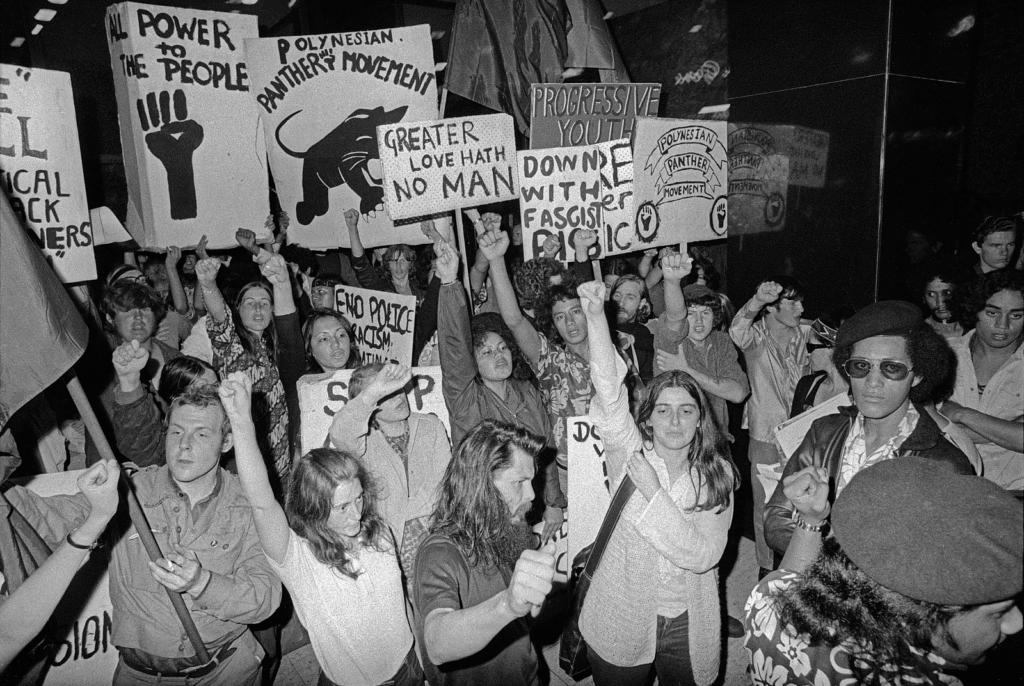
https://ourauckland.aucklandcouncil.govt.nz/media/j2rdig5l/dawn-raids-photographer-john-miller-1972.jpg
Another significant long-term impact regarding those involved in the Dawn Raids was the development of activism against injustice. New Zealand activism in the 1970s was greatly inspired by similar occurrences in America at the time, giving this impact a global context. Prior to the Dawn Raids themselves, a movement had already been gathering – the Polynesian Panthers, an organisation of young Islanders dedicated to building unity within their communities, inspired by the American group, The Black Panthers. As a long-term impact, this advancement in activism over the years was evident during the Springbok Tours in 1981, a rugby Tour notorious for its controversiality that took place around six years after the Dawn Raids.
Historical civil rights.
Though activism had still been prominent prior to the Dawn Raids, the rise of the Polynesian Panthers specifically proved significant due to their effect on not only the Dawn Raids but other historical civil rights movements in the time after the Raids, such as the Springbok Tour. Many Polynesian Panthers, such as Tigilau Ness, fought in the forefront of violent protests, protests that may have only picked up speed and number due to the activist roots put down by those participating in the Dawn Raids.
While they all protested against the racist laws in South Africa and New Zealand’s accountability in the matter, a portion also advocated for the treatment of those in New Zealand additionally. Hone Harawira, a Maori activist, outlines the purpose of this activism in the quote: “The Panthers gave voice to a sector of society no-one gave a shit about…” The Dawn Raid’s existence propelled Pacific activism in groups such as the Polynesian Panthers, which added levels of interest to later activism ventures such as the Springbok Tours of 1981.
Times Do Change.
What has been widely accepted by many in New Zealand now as harsh, unnecessary and harmful methods in a plan of targeting the Pacific population of NZ was once considered orderly and justified by the majority of the Government and most of the public. This change in widespread societal beliefs can be attributed as a long-term impact of advocacy for the rights of Pacific Islanders, Maori, and people of colour alike in the time of the Dawn Raids. An example of this multicultural acceptance and appreciation is Polyfest, a fifty year old annual festival held in Auckland as a showcase of a variety of cultures, featuring dancing, food, competitions and performances.
The thousands of people partaking or simply experiencing the shows are a far cry from the time it originated from – 1976, not long at all after the Raids themselves, but far outliving the conditions people lived through at the time. Polyfest is only one of many institutions, programs and exhibits that display how far New Zealand has come from the times of the Dawn Raids, growing into the diverse society that it is today. As the Polynesian Panther icons such as Tigilau Ness and Dr Melani Anae who spoke out about their experiences have said, there is still work to be done in efforts of further unifying New Zealand’s population, no matter where they came from, but the improvements made since the Dawn Raids are truly a feat.

Senara Senanayake.
Bibliography:
- (Accessed 06/06/25) The Detail: Dawn Raids shame lives on – but gradually people are talking about it
- (Accessed 06/06/25) How the Polynesian Panthers gave rise to Pasifika activism.
- (Accessed 09/06/25) Dawn Raids Documentary
- (Accessed 11/06/25) Ardern gives formal apology
- (Accessed 12/06/25) Polynesian Panthers. Nevak ‘Ilolahia. 2010
- (Accessed 12/06/25) Dawn Raids, Ugly Reality

